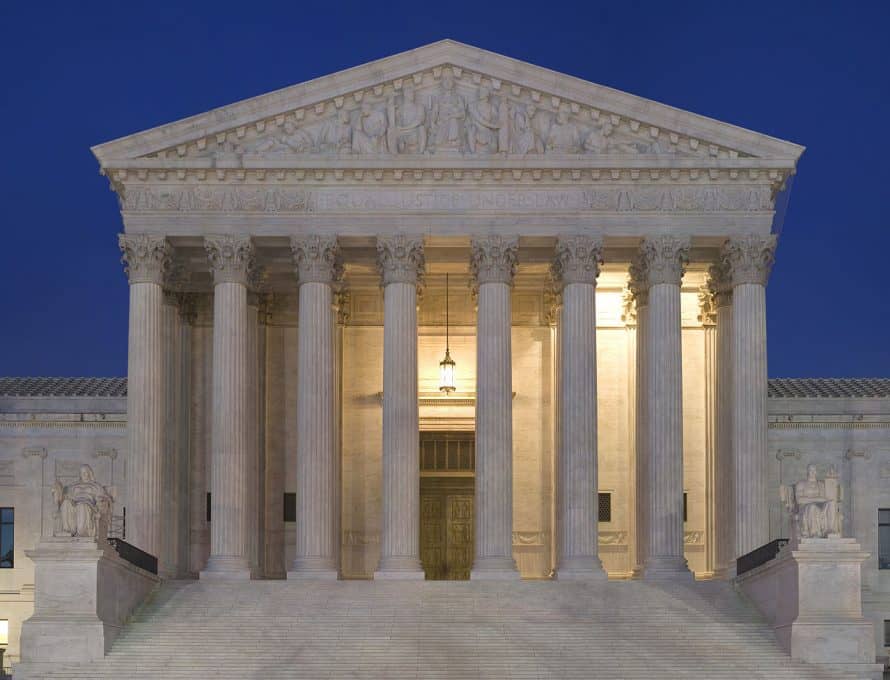WASHINGTON – Two Missouri Baptist attorneys were on the legal team presenting arguments last week at what many have called the most important religious liberty case to come before the United States Supreme Court in decades.
Michael Whitehead, legal counsel for the Missouri Baptist Convention, and his son, Jonathan Whitehead, joined David Cortman, senior counsel and vice president of U.S. litigation with Alliance Defending Freedom, at the Supreme Court, April 19, where they argued that the state of Missouri unconstitutionally discriminated against Trinity Lutheran Church of Columbia.
The April 19th hearing also marked Justice Neil Gorsuch’s first week sitting on the bench at the nation’s High Court and his first opportunity to address a significant religious liberty case.
At first sight, the problem that gave rise to this legal dispute seems less than the stuff of a major religious liberty case: In 2012, the state of Missouri denied Trinity Lutheran Church’s request to receive a grant from Missouri’s Scrap Tire Program. With the help of this grant, the church’s preschool wanted to remove and replace a large portion of pea gravel surfacing on its playground with a safer rubberized surface made from scrap tires.
But here’s where religious liberty becomes the crux in this case: The state of Missouri ultimately denied the church this grant simply because they were a religious organization, even though the church had initially qualified for a $20,000 grant from the state.
The state justified its decision by citing part of Missouri’s Constitution called “The Blaine Amendment,” which says that “no money shall ever be taken from the public treasury, directly or indirectly, in aid of any church, sect or denomination of religion.” Such “Blaine Amendments” were established in 39 state constitutions throughout the nation during the 1870s.
Speaking to the Missouri General Assembly during a surprise visit, April 19, U.S. Sen. Roy Blunt (R-Mo.) said that he, along with Representative Vicky Hartzler (R-Mo.), filed an amicus brief with the Supreme Court, asking the justices to vote in favor of the church.
“The Blaine Amendment is an amendment that has outlived its time, if it ever had a time, and this is an important case,” Blunt said. “The issue is probably a whole lot bigger than the playground program using shredded tires.”
Indeed, the case is much bigger than the use of shredded tires on a church playground, according to Travis Wussow, vice president for public policy and general counsel with the Southern Baptist Convention’s Ethics & Religious Liberty Commission.
“At the end of the day, what the case is about is whether the government can exclude people of faith from the resources of the public square simply because they are people of faith,” Wussow told The Pathway. “And, on a deeper level, the case is about whether the government can make distinctions between religious and non-religious organizations just based on the convictions that those organizations hold.”
Trinity Lutheran Church filed suit (Trinity Lutheran Church v. Comer) against the director of Missouri’s Department of Natural Resources in 2013, ultimately appealing to the U.S. Supreme Court in 2015. Last Wednesday, they finally had their day in court—and, for many onlookers supporting the church, the day offered cause for hope.
“The justices asked hard questions to both sides, but the most provocative questions were directed at the state’s attorney,” Jonathan Whitehead said in a written statement. “After an hour of argument, over half of the justices seemed inclined to the church’s legal position. Our legal team could not be more pleased or more optimistic for a victory.”
“You can never absolutely predict the vote just based on the justices’ questions and comments,” Michael Whitehead added, “but many observers are saying that a 7-2 vote for the church is not unlikely.”
What has most surprised the church’s attorneys were the questions raised by Justice Kagan and Justice Breyer, who had been expected to oppose the church.
“You know you are having a good day … when justices you thought would be against you are interrupting the opposing counsel to support key elements of your legal argument and are calling them clear,” Michael Whitehead said.
In one instance, Justice Kagan announced that the state of Missouri had, in fact, discriminated against the church: “… this is a clear burden on a constitutional right,” she said. “ … It’s a burden on constitutional right, in other words, because people of a certain religious statues are being prevented from competing in the same way everybody else is for a neutral benefit.”
Likewise, newly appointed Justice Gorsuch questioned the state’s attorney about when the state may discriminate against a church and when it must treat churches as it would any other non-profit organization.
“Everyone is watching for the questions he is asking, and today (April 19), he seemed to favor the church’s legal position in the case,” Jonathan Whitehead said.
Adding to the Whiteheads’ optimism about this case, Michael Farris—president of Alliance Defending Freedom, the legal organization representing the church—said that “religious people should not be treated as second-class citizens, especially when it comes to health and safety issues.
“A lot of the justices today (April 19) seemed particularly concerned about the fact that the discrimination context here was health and safety,” Farris told reporters after the hearing, according to Baptist Press. “I feel very encouraged by the hearing today. We’re very hopeful.”
The Supreme Court is expected to rule on this case around the end of its term in late June.
Both Whiteheads are members of Abundant Life Baptist Church in Lee’s Summit.

